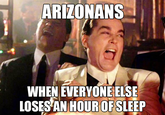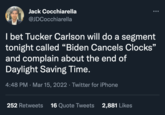Permanent Daylight Saving Time
Submission 6,947
Part of a series on United States of America. [View Related Entries]
| Navigation |
| About • Background • Online Reactions • Search Interest • External References • Recent Images • Recent Videos |
About
Permanent Daylight Saving Time, also referred to as the End of Daylight Saving Time, refers to a bill called the Sunshine Protection Act that was unanimously approved in the U.S. Senate in mid-March 2022 regarding the removal of daylight saving time, a controversial and bi-annual event that required Americans to change their clocks by an hour. The amendment was set to be in effect in 2023 if approved by U.S. President Joe Biden. It was championed by Florida Senator Marco Rubio. Memes about the "end" of daylight saving appeared online shortly after, with many U.S. citizens finding the practice increasingly unnecessary over time.
Background
History of Daylight Saving
Forms of daylight saving time (DST) have existed throughout human history, dating as far back as the Romans who kept time with water clocks that had different scales for different months of the year.[1] Modern DST was first hinted at by American Founding Father Benjamin Franklin when, in 1784, he wrote a satirical letter to The Journal of Paris that suggested waking up earlier in the summer would economize candle usage[1] by making the day have less darkness to help citizens not use up all their candles.
Modern DST was first proposed in New Zealand by entomologist George Hudson. In 1895, he presented a paper to the Wellington Philosophical Society that proposed a two-hour daylight-saving shift.[1] Similar declarations were approved in Great Britain going into the early 20th century. In essence, the need for DST came down to public transportation. As trains became a common form of travel, strict schedules were essential.
In 1833, time zones were introduced by railroad companies in the United States.[2] The Interstate Commerce Commission (ICC) within the United States was essentially in charge of time laws, overseeing zones and DST. During World War I, Germany first implemented DST to conserve fuel and power by extending daylight hours. The United States followed in their footsteps. After the war, however, DST was abolished nationwide and ran on a state-by-state basis.[2] This led to confusion and collisions within railway systems and forced the creation of the Department of Transportation in 1966. They implemented DST nationwide that year.
History of Permanent Daylight Saving
Daylight saving time, from its start, had opposition. For instance, Germany didn't keep DST for long after its implementation in WWI, abolishing it from 1919 to 1939 due to complaints from farmers.[1] In Great Britain, after DST was proposed in 1907, it had various opponents. In general, retailing, sports and tourism interests have historically favored daylight saving, while agricultural and evening entertainment interests have opposed it.[1] In America, DST received opposition immediately within the government. In 1909, Congressman Andrew Peters introduced a DST bill to the House of Representatives, but it soon died in committee.[1]
Sunshine Protection Act
American, 21st-century proponents of permanent DST start with the states of Arizona and Hawaii making DST permanent. In 2018, lawmakers in Florida such as Marco Rubio and Rick Scott made DST permanent in their state.[3] A year later, in March 2019, Rubio and Scott enacted the Sunshine Protection Act to make daylight saving time permanent year-round. If passed, the legislation would apply to all states that participate in daylight saving time from March to November each year. On March 11th, 2019, President Donald Trump voiced his support to eliminate DST, tweeting "Making daylight saving time permanent is O.K. with me!"[3] However, the act failed in 2019.
On January 4th, 2021, an iteration was filed in the U.S. House of Representatives by Florida Senator Vern Buchanan and in the U.S. Senate by Rubio on March 9th, 2021.[4] On March 15th, 2022, the Sunshine Protection Act unanimously passed the U.S. Senate.
Shortly after, news outlets began reporting on the story and spreading the news, such as the news site The Recount, which tweeted a video about it on March 15th, 2022, receiving over 2,200 likes in less than 24 hours.
Online Reactions
Reactions to the Sunshine Protection Act passing through the U.S. Senate populated social media in the form of memes on March 15th, 2022, most of them being positive affirmations for the bill. For instance, Instagram[5] page chad_political posted a political compass meme that inserted positive Feels characters into every square, earning roughly 2,200 likes in one day (shown below).
On March 15th, Twitter[6] user BudrykZack posted a tweet that took a different humorous take on the situation, playing off an old cliche regarding DST messing up people's vibes. His tweet (shown below) earned over 20 likes in one day.
In general, memes and tweets about daylight saving time appear every March and November en masse, often related to it being perceived as unnecessary. For instance, on November 3rd, 2019, Twitter[7] user rakeshsatyal tweeted, "Daylight saving time is like 'What if night began at lunch?,'" earning roughly 73,800 likes in three years (shown below, left). On November 7th, 2021, Twitter[8] user usedwigs made a joke about his dog not being aware of DST, earning roughly 42,900 likes over the course of four months (shown below, right).
Search Interest
External References
[1] Wikipedia – Daylight saving time
[2] bts.gov – History of DST
[3] WPTV – Florida lawmakers want 2019 to be the last time anyone has to 'Spring Forward'
[4] Wikipedia – Sunshine Protection Act
[5] Instagram – @chad_political
[6] Twitter – @BudrykZack
[7] Twitter – @rakeshsatyal
Share Pin









